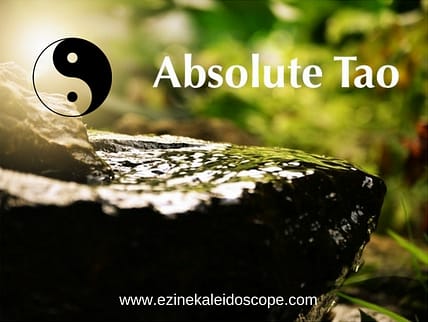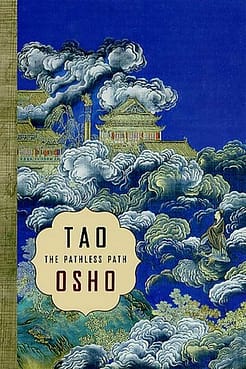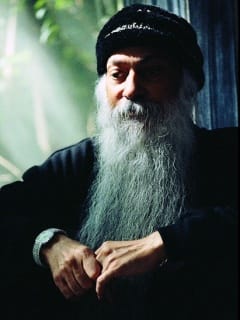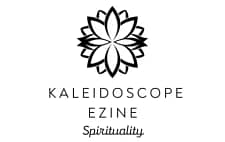 Those who have known, not by words, not by scriptures but by actually living life, from amongst those very few, Lao Tzu is one. And from amongst those yet fewer persons, who having known, have ceaselessly endeavoured to reveal what they have known, Lao Tzu is one. But the very first experience of those enlightened ones, who have tried to express what they have known is, that: whatever is expressible is not Truth.
Those who have known, not by words, not by scriptures but by actually living life, from amongst those very few, Lao Tzu is one. And from amongst those yet fewer persons, who having known, have ceaselessly endeavoured to reveal what they have known, Lao Tzu is one. But the very first experience of those enlightened ones, who have tried to express what they have known is, that: whatever is expressible is not Truth.
That which can assume form, invariably loses its spiritual power (of the Formless). Now if someone wishes to make a picture of the sky, this can never be. Whatever picture is made, it will not be of the sky, for space is that which embodies everything. A picture cannot contain anything; it, in itself is surrounded by space. So Truth expressed in words, will be like the skies depicted in a picture. No bird can fly in the sky of a picture, no sun comes out in the morning or stars at night. It is dead for all purposes and the sky only in name. The sky cannot be in a picture.
The greatest difficulty that a person encounters when he sets forth to express Truth is, that no sooner Truth is converted into words, it becomes Un-Truth. It becomes just what it is not. Then what was to be conveyed, remains unsaid; and what was not to be conveyed, is given voice. Lao Tzu starts his very first line with this statement.
Tao is a peerless word. Try to understand its full meaning so we can proceed with ease. There are many meanings of Tao. The deeper a thing becomes, the more meanings it develops; and when a thing becomes multi-dimensional, it is but natural that it becomes more intricate. One interpretation of Tao is: ”The Way.” But, all paths are bound and fixed! What sort of a path is Tao? It is like the path that a bird makes; in the skies as it flies – the path is formed but it is not fixed. All other paths leave their marks behind, which makes it easy for others to follow. Tao is a path like the bird makes in the skies – there are no footprints left behind for the convenience of others to follow. If we visualize a path that is unconstructed, a path where there are no footprints, a path that no other person can create for you – you travel and as you travel the path is formed – then we can interpret Tao as: ’The Way’.
But such a path we see nowhere! Therefore, is it proper to call Tao – ’The Way’? This however, is one dimension of Tao. Now let us take another meaning of the Path. A path is that which takes us to a destination. A path is that which joins us to the destination. But Tao is not such a path. When we walk along a road and reach the destination, both the road and the destination are connected to each other. In fact the destination is the last end of the road and the road is the beginning of the destination. Therefore, the path and the goal are not two different things – they are joined allied to one another.
The road cannot be without a destination, nor can the destination be without a road. But Tao is a path that is tied to no destination. When a destination is connected with a path, the length of the journey is known. So the traveller knows the distance to the destination. But Tao is such a path where the traveller attains his destination at the very place he stands! Therefore, Tao cannot be likened to the general concept of a path. It is a path where we attain the destination from the very place we stand upon. It can also be that we travel for millions of births and not attain it. Invariably then, Tao is a different kind of a path. So one meaning of Tao is ’The Path’ but in a very intrinsic sense – and with very many conditions.
Another interpretation of Tao is ’Religion’. But Religion not in the sense that we generally understand. Religion here is what the ancient Rishis meant. Religion means the Regulation that holds all within itself. The Ultimate Law that holds all Existence, is the Tao Religion. And this Religion is not akin to the Hindu, Islam or the Buddhist and Jain religions. Religion is the Absolute Law of Existence. Religion means the Eternal Law of Life. But all laws are limited. Tao is a Law that has no boundaries.
In fact, all boundaries pertain to death; there are no limitations to Life. Dead things alone are limited. Live things are not limited they are boundless. The very meaning of life is one continuous ability of expansion. If a seed is alive it can turn into a seedling. If a seedling is alive, it can turn into a tree. If a tree is alive. more seeds and seedlings can come out of it. Where the ability to expand stops. Life stops with it. This is why a child is more alive than an old man, for its ability to expand is very great. So Tao is not the Law in any limited sense. It is not a law like any man-made laws, that can be defined, that can be enclosed within a boundary. Tao is a Law that is Infinite Expanse, capable of touching the Infinite, the Boundless. Therefore to call it merely Religion, will not do.
There is one other word that the Rishis have used and which is perhaps, the nearest to Tao. That word is ’RIT’ from which the word ’RITU’ (season) was evolved. The Ritu they talk about is the discussion of Tao. If we try to understand the word ’Rit’, by seasons it will be easier.
Summer comes and then the rains and then Winter follows. Then again it is Summer. It is a recurring circle, that keeps revolving. First there is childhood, then comes youth, then old age and thereafter death. It is a circle that keeps revolving. First there is morning, then evening and then night, then again it is morning. The Sun rises, then it sets, then it rises again – it is a circle. Life moves in a circular manner. The Controlling Factor of this movement is what is known as ’Rit’. Remember, there is no concept of any God in this word ’Rit’. It means the ’Controlling Principle’ and not a Controlling Person. It is not a person who controls, rather, it is a principle that goes on controlling. And this too, is not correct for it gives the impression of a being that controls. It would be more proper to say, ’That from which the Principle occurs, that from which the Principle evolves.’ It is not that someone creates the laws and forms regulations – no; the laws are continuously formed through it. As the sprout springs from the bud, so the seasons come out from ’Rit’. This also is one of the intrinsic meanings of Tao.
Yet, none of these words convey the vital meaning of the word Tao, for whatever meaning is given to it, Tao is yet infinitely greater; for something or the other is always left out. This is the greatest difficulty with words that all words are formed out of duality. If we say night, the day is left out; if we say light, darkness is left out; if we say life, death is left out. Whatever we say, something is always left out; and Life, Existence, is one whole amalgam. There night and day are no two separate things, birth and death are not two different events; neither is a child and an old man two different entities, nor are hot and cold two different states. There, when the Sun rises in the morning, it also sets in the night.
Life is such – united, whole but whenever we try to express in words, something is left out. If we say ’day’, the night is left out but night too, is within the Existence. Whenever we make a pronouncement – this is Tao, this is the Path, this is the Religion, or the ’Rit’, – with the very pronouncement, something is left unpronounced. Now for instance, suppose we say the word ’Regulation’, with the very mention of this word, we leave out chaos whereas in life, chaos also is. With the very word ’Regulation’, that which is anarchic, the chaotic factor, is left behind. Nietzsche has written somewhere, ”How will new stars come into being if disorder is no more? How will new creation come into being if there is anarchy no more?”
Creation is born out of disorder, anarchy. Out of chaos comes creation. In the absence of chaos, there can be no creation. And if creation alone is, it will never end, for it will have to plunge into chaos to end itself. When we say, ’The Principle,’ we leave out chaos; but this too, is a part of Existence. There is no way of leaving it out of existence; we can only brush it aside with words. So when we say ’Rit’, then also something is left out and that is – chaos; which happens and yet happens outside of the Principle. Everything in Existence does not occur with Principle, or else life would become worthless. There is something in this Existence that happens outside this Law. Whatever is nonsignificant obeys the Principle but the most profound experiences of life follow no regulations.

They come suddenly, uncalled, without any cause, and knock at your door. The day, the advent of God takes place in a person’s life, he cannot say that because he did such and such a thing therefore he attained Him. Then, he is only able to say: ”What compassion, What mercy, my Lord! I have done nothing to deserve this honour. Whatever I did, had no connection with this, Your coming! How did You come? I never desired You, I never wished for You, nor did I ever seek You. And if I ever desired you, I desired you in a wrong way and if I ever sought You it was in places where You were not and if I ever wished for You I never believed You will ever come my way! Then this – Your Coming! Oh Lord Oh Lord!” When God enters into someone’s life, His advent has not the remotest connection with any action on the part of the individual. He comes suddenly, uncalled!
If everything in Existence was based on Principle, then we could say that Tao means ’Rit’. But that which is outside of this Regulation in Life and which is present every moment and appears suddenly, without a cause, we cannot leave outside of Life and Existence. So then, what shall we call Tao?
In his very first Sutra, Lao Tzu says! ”The Tao that can be trodden is not the enduring and unchanging Tao.” Now a path means that which can be trodden upon. But Lao Tzu says, ”Not the path that can be trodden upon; not the path on which you can walk!” Now if we cannot tread this path, what is the point in calling it a path? If only we can walk on it, could it be a path. But Lao Tzu says otherwise – ”That which can be trodden is not the enduring, unchanging Tao!”
There are many things to this small sutra. First and foremost, the path that can be trodden, on which the incidence of walking takes place, the event of reaching does not take place there. Where we have to reach is nowhere away from us. It is here and now. If I have to come to you; I shall have to come along a path but if I have to go to myself, what path shall I follow? And the more I set out on a journey to reach myself the more I shall wander. I shall go further and further away! from myself. He who sets out on a path to find himself, will never reach himself. How will he? He will lose himself with his own hands by this search. He who wants to seek his own Self, has to leave all paths, for no path leads to the Self. In fact, no path is required to reach the self, for paths are required to reach ’the other’. He reaches his own self who leaves all paths and steps aside. He who does not walk, reaches! It is therefore that Lao Tzu says: ”The Tao that can be trodden is not the enduring and unchanging Tao.”
Lao Tzu says two things: One is, that it is not eternal and enduring. In fact, whatever path we can tread upon, will be formed by ourselves and since it is formed by ourselves, it cannot be enduring. It will be created by man and therefore not created by God. And how can a path that is carved out by us, lead to Truth? If we had the knowledge of the temple of Truth, then we could carve a road that leads up to it. Remember a path can only be made if the destination is known. If I know your house, I’ll find a way to reach it. But this is very difficult that I should reach your house without following a specific way. Or else, how will I know where your house is?
An ancient Egyptian Scripture says: ”When you meet God and you recognise Him, then you will surely say, ’Forsooth, I have always known You!’” If you cannot say this, then how will you recognise God? Then recognition is impossible. The meaning of recognition is to identify that which is known before. If God stands before me and I get up and ask Him; ”What is Your good name?” I shall then never recognise God. And if at the very first glance I recognise Him – that it is He! – it means that at some moment, in some corner of my consciousness, through some opening, I have known Him – to-day, I have recognised Him. We can only recognise what we have known. If you know already where Truth is, where is the need for a path for you? You have reached Truth, you have known it. So the one who knows, makes no paths; one who does not know, makes paths. And how can the paths made by those who do not know ever take you towards Truth?
That cannot be the enduring path.
Which is the enduring path? The Path that was never made by Man; it was when Man was not; and it will be when Man is not. It is that Path which is not created by the Rishis of the Vedas; that is not created by any Buddha, Mahavira, Mohammed, Christ or Krishna. At the most, they can only give news of this Path. So, which is the Enduring Path? In this context the Rishis never say that what they say is their own. They always say, ”So it has been said by others before us: so has It always been known to Man. The tidings we bring is of that Path which is eternal. It was, when we were not and it was even when there was no one. When the Earth disintegrates and Life begins to depart, it still will be. Like the vast expanse of the Skies, it was always present.
It is a different matter that our wings were not strong enough till yesterday to fly; today we can. It is yet a different matter that even today we cannot gather courage enough and sit at the edge of our nest, sizing up our wings, turning within our minds whether to fly or not to fly. But the skies are not formed by your flying. When you did not have your wings; when you were imprisoned within the ego: it still was. And even if today, in spite of your wings, you remain sitting and refuse to fly, the skies will not disintegrate on your account. Space is – even without you. So the Enduring Path is that which is devoid of travellers. If a path depends on the traveller, it cannot be enduring.

He who steps out of all maladies does not walk any more – there is no need to. He has reached. He who is filled with disease, keeps walking. He walks in order to escape his maladies; but whichever path he treads becomes infected with his disease. Wherever he halts, the place becomes unholy. Wherever he seeks, he only succeeds to create more smoke. It is just as when a man steps into a pool of stagnant waters and disturbs the slush below. All his efforts to put down the slush, will only help to raise the remaining slush from below. The more desperately he tries, the more turbid the water becomes, for more slush rises to the surface, making the water more dirty. If Lao Tzu happens to pass by, he would tell him, ”Friend, come out! That which you try to purify, becomes impure, for you yourself are impure. Please come out. Leave the water alone. Sit on the shore, the water will purify itself. You leave all efforts for they are dangerous – one and all!”
The Path on which sick people walk, cannot be the enduring path.
Also remember, it is only the sick who walk. Those who reach, those who are purified, who have known, they stop. For then there is no question of walking. In truth, we roam only because some desire goads us on. All desires are unholy. Even the desire of attaining God is unholy. The desire to attain liberation also is not without its stink. Actually wherever there are desires, the mind becomes ugly. A mind full of desire, is a mind filled with tension. Where there is the urge to reach; where there is the eagerness, the expectancy, there is born the madness of wandering. And then all sicknesses gather together.
Osho, The Way of Tao Volume 1


